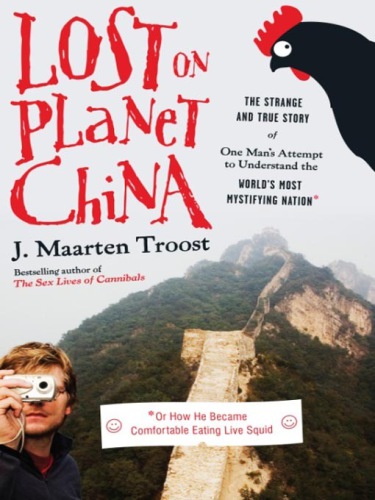
Lost on Planet China
The Strange and True Story of One Man's Attempt to Understand the World's Most Mystifying Nation or How He Became Comfortable Eating Live Squid
کتاب های مرتبط
- اطلاعات
- نقد و بررسی
- دیدگاه کاربران
نقد و بررسی

June 2, 2008
Troost, J. Maarten. Lost on Planet China: The Strange and True Story of One Man's Attempt to Understand the World's Most Mystifying Nation, Or How He Became Comfortable Eating Live Squid. Broadway. 2008. c.304p. TRAV~ Troost tackles modern China with his trademark wit and unstinting honesty. A genuine pleasure to read, this book is recommended for all public libraries. Background: Troost initially traveled to China to see if he and his family could move there and escape Sacramento's pollution and crime. Rather than a refuge, he finds a country changing fast while skipping over nuisances like human rights, copyrights, and pollution controls. Troost (The Sex Lives of Cannibals) is ruthless in his portrayal of China as terribly polluted ("In no way was I ready for the swirling filth that constitutes air in Beijing"), a nation of knockoffs and rip-offs, and cruelly authoritarian in its treatment of Tibet. The author is constantly besieged by offers of questionable Rolexes and Mont Blanc pens and badgered by taxi drivers, beggars, and entrepreneurial women offering massages. A sojourn in the Chinese countryside provides welcome respite for the author and continued entertainment for the reader.--Lee Arnold, Historical Society of Pennsylvania, Philadelphia.

November 15, 2008
After living onand writing aboutislands in the South Pacific ("The Sex Lives of Cannibals"), Troost now tackles China. As with his previous books, he does so with wit and the great ability to tell a good story. It is also clear that he has not written this book with cooperation from any official Chinese tourist bureau. China comes off as terribly polluted: "in no way was I ready for the swirling filth that constitutes air in Beijing. It was, frankly, apocalyptic"; a nation of knock-offs and rip-offs, and cruelly authoritarian (Tibet). Troost is constantly besieged with offers of questionable Rolexes and Mont Blanc pens and is badgered by taxi drivers and beggars. It seems as if every hotel he stays in has an established brothel, or at least entrepreneurial women offering massages. His traveling fortunes turn when he gets out into the countryside, away from the overcrowding and pollution and back to nature. Troost went to China on the pretext of checking it out, after toying with the idea of moving his wife and kids there (to flee the pollution and crime of Sacramento). What he finds instead is a country changing fast while skipping over nuisances like human rights, copyrights, and pollution controls. Ending on an upbeat note, he does concede that China is probably better than North Korea. Troost's books are a pleasure to read. Recommended for public libraries.Lee Arnold, Historical Soc. of Pennsylvania, Philadelphia
Copyright 2008 Library Journal, LLC Used with permission.

July 1, 2008
Troost, who entertained readers in The Sex Lives of Cannibals (2004) with tales of life on a South Pacific island, nowturns his attention to China. Settled in Sacramento, California, with his wife and two sons, Troost gets restless and floats the idea of moving his family to China. His wife is amenable, so he sets off to scout ahead. What he findsin Beijing is a crowded, smoggy city where something as simple as taking a walk can be a dangerous proposition, given the hazardous traffic. Troost visits one burgeoning industrial city after another, finding immense crowds, odd cuisine, piteous beggars, and masseuses offering sexual favors. He also discovers a country that firmly believes that its on the edge of something big; in spite of a great divide betweenpoor andrich, China is undergoing a tremendouspush toward modernity. Troostscrisp, engaging prose invites the reader to experience his adventures right alongside him. At turns meditative, whimsical, humorous, and shocked, Troost is an excellent guide to the vast, multifaceted country that is modern-day China.(Reprinted with permission of Booklist, copyright 2008, American Library Association.)

























دیدگاه کاربران